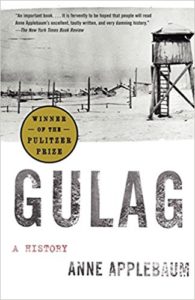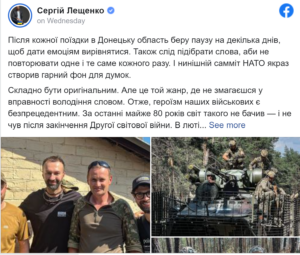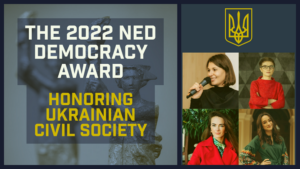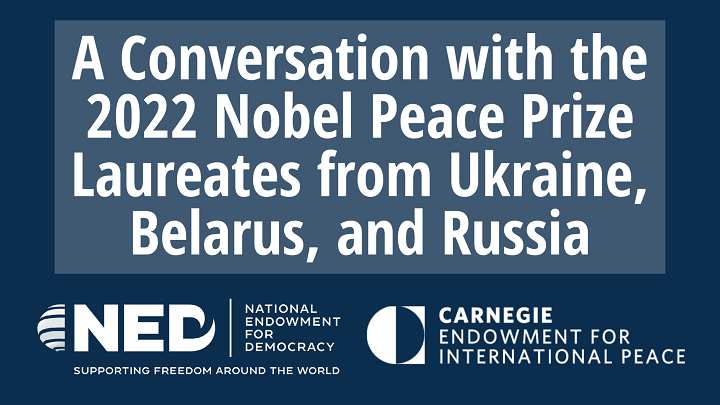At least 4,000 civilians are held in Russia and at least as many scattered around the occupied territories, according to Vladimir Osechkin, an exiled Russian human rights activist who talks to informants within Russian prisons and founded Gulagu.net to document abuses, AP reports:
Osechkin showed AP a Russian prison document from 2022 saying that 119 people ‘‘opposed to the special military operation’’ in Ukraine were moved by plane to the main prison colony in the Russian region of Voronezh. …. A building in Rostov is one of at least 40 detention facilities in Russia and Belarus, and 63 makeshift and formal in occupied Ukrainian territory where Ukrainian civilians are held, according to an AP map built on data from former captives, the Ukrainian Media Initiative for Human Rights, and the Russian human rights group Gulagu.net.
 A new gulag is emerging, historian Anne Applebaum tweeted.
A new gulag is emerging, historian Anne Applebaum tweeted.
Experience shows that equivocation about Ukraine’s place in Europe invites Russian aggression, say Alina Polyakova, President and CEO of the Center for European Policy Analysis, and Daniel Fried, a Distinguished Fellow at the Atlantic Council.
Ukraine should start negotiating only when it is in the strongest possible position; it should not be rushed into talks when Russia shows no interest in any settlement terms other than Ukraine’s surrender. Starting negotiations now would mean accepting Putin’s maximalist terms, they write for Foreign Affairs.
In order to join NATO, Ukraine has to show that it can handle modern military technology, or that it is a thriving democracy? Eliot A. Cohen writes for The Atlantic. Compare it with militarily negligible and politically contemptible Hungary, and the absurdity of these kinds of requirements becomes clear.
“Ukraine earned NATO membership with their blood without any conditions, which are now unable to voice even those who block our only invitation to join,” noted pro-government journalist Serhiy Leshchenko (below), The Post’s Christian Caryl reports. “Therefore, the declarations made in Vilnius are painful to hear after conversations with people for whom every day may be the last,” said the former NED Reagan-Fascell fellow.
 For 500 days, the Ukrainian people have endured threats of injury and death from Russia’s brazen aggression. Russia has ruthlessly attacked homes, schools, hospitals and shopping malls while trying to destroy cities and towns’ critical infrastructure, notes ShareAmerica.
For 500 days, the Ukrainian people have endured threats of injury and death from Russia’s brazen aggression. Russia has ruthlessly attacked homes, schools, hospitals and shopping malls while trying to destroy cities and towns’ critical infrastructure, notes ShareAmerica.
Exactly contrary to his express war aims in Ukraine, Mr. Putin has managed to transform Russia’s geopolitical position for the worse. Sweden and Finland have moved from their long-held tactical position of NATO non-membership to all-in with the alliance, notes Tod Lindberg, a senior fellow at the Hudson Institute.
Even in defeat, however, Russia isn’t going anywhere, he writes for The Wall Street Journal. It is difficult now to fault Russia’s Baltic neighbors and other Central and Eastern European NATO members for their often-voiced post-Cold War suspicions about Russian intentions. Were postwar Moscow somehow to turn benign, nothing guarantees it would remain so. The security needs of Russia’s neighbors are permanent. That’s geopolitics.
 If Ukrainian President Volodymyr Zelensky said today that he was willing to consider a peace deal that left any Ukrainian territory in Russian hands, he’d be thrown out of office. The Ukrainian people are in no mood for compromise, Marc A. Thiessen and former deputy secretary of state Stephen E. Biegun write for The Washington Post:
If Ukrainian President Volodymyr Zelensky said today that he was willing to consider a peace deal that left any Ukrainian territory in Russian hands, he’d be thrown out of office. The Ukrainian people are in no mood for compromise, Marc A. Thiessen and former deputy secretary of state Stephen E. Biegun write for The Washington Post:
A Gallup poll published in October found that 70 percent favor fighting until victory, which they overwhelmingly define as retaking all territory seized by Russia since 2014, including Crimea. A Democratic Initiatives Foundation poll published in May found those views virtually unchanged: Sixty-seven percent of Ukrainians said that no concessions to Russia were acceptable, while just 22 percent supported some compromises to end the war.
As distant as the possibility seems, the West will never build a constructive relationship with Russia until the option of aggression against Ukraine is off the table once and for all, add Thiessen and Biegun, a board member of the National Endowment for Democracy (NED).
 A Conversation With the 2022 Nobel Peace Prize Laureates From Ukraine, Belarus, and Russia
A Conversation With the 2022 Nobel Peace Prize Laureates From Ukraine, Belarus, and Russia
Join the Carnegie Endowment, the National Endowment for Democracy (NED), and the 2022 Nobel Peace Prize laureates for a conversation about human rights, historical memory, and accountability. This event will feature leaders from the Ukrainian Center for Civil Liberties and Russian human rights organization Memorial, as well as a representative of jailed Belarusian activist and director of the human rights organization Viasna, Ales Bialiatski.
July 26, 2023. 11:00 AM—12:30 PM EDT (UTC-4), Washington, DC. RSVP
Oleksandra Matviichuk directs the Center for Civil Liberties, a Ukrainian human rights organization founded in 2007 to advance democracy in Ukraine. The organization has documented Russia’s crimes against Ukrainian civilians since 2014.
 Kanstantsin Staradubets is a Belarusian human rights activist and coordinator of the Viasna Human Rights Center. He will represent Ales Bialiatski, currently imprisoned by the Lukashenko regime. Bialiatski has been a pillar of the Belarusian pro-democracy and human rights movement since the late 1980s and founded Viasna in 1997.
Kanstantsin Staradubets is a Belarusian human rights activist and coordinator of the Viasna Human Rights Center. He will represent Ales Bialiatski, currently imprisoned by the Lukashenko regime. Bialiatski has been a pillar of the Belarusian pro-democracy and human rights movement since the late 1980s and founded Viasna in 1997.
Aleksandr Cherkasov is chair of the Russian human rights center Memorial, founded in 1987 to collect information on victims of the Soviet regime and to document human rights violations in contemporary Russia. The organization was banned in Russia in 2021.
When Russia launched its full-scale invasion of Ukraine, the world was shocked to learn how often Russians fell for the Kremlin’s pro-war propaganda pushed through loyal state media, the Harriman Institute adds. In a forthcoming talk, analyst Anton Shirikov will explain how authoritarian media can gain and cultivate such public trust, presenting evidence from surveys and experiments he conducted in Russia in recent years. Moderated by Harriman Director, Valentina Izmirlieva.
September 29, 2023. 12:00 pm – 1:30 pm. Marshall D. Shulman Seminar Room, 1219 International Affairs Building, 420 W 118th Street, 12th floor New York, NY 10027 United States. RSVP
A new Gulag is emerging https://t.co/sEyAohC8xy
— Anne Applebaum (@anneapplebaum) July 13, 2023







